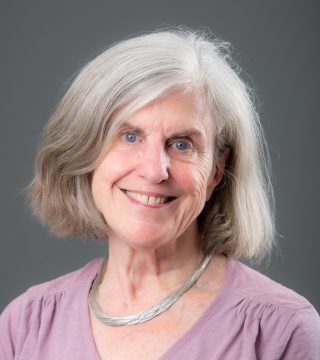Martha (Marty) Bruce, PhD, MPH, first met Alan I. Green while being recruited to Dartmouth from Weill Cornell Medical College where she was a professor of sociology in psychiatry. It was 2015 and Green, the Raymond Sobel Professor of Psychiatry at Geisel School of Medicine, was chair of the Department of Psychiatry at Geisel and Dartmouth Health and director of SYNERGY—Dartmouth’s Clinical and Translational Science Institute that catalyzed research and trained scientists across the translational spectrum with a focus on rural healthcare delivery.

Once at Dartmouth, Bruce took an active role in SYNERGY’s career development and mentoring program, that she would then co-lead, developing a congenial relationship with Green. As the institute’s renewal grant loomed, she joined Green together with others to write the renewal application—Bruce has a long history of successfully writing and reviewing National Institutes of Health (NIH) grants. Fondly recalling the rhythm of their collaboration, she says, “Working together was intensive and time consuming, but also intellectually stimulating and gratifying. And with Alan, it was a great deal of fun.”
Both SYNERGY and the Department of Psychiatry under Green’s leadership thrived. The department grew into a major provider of psychiatric care in northern New England and enhanced its national academic stature in education and research. Psychiatry and psychology teaching and training for medical students, residents, fellows, interns, and post-doctoral fellows flourished during his tenure and research initiatives blossomed.
Under Bruce’s leadership, mentorship flourished as well.
After Green’s death in 2020, his family honored his lifelong commitment to teaching and mentoring by establishing an endowed fund to support the creation of the Alan I. Green Research Mentorship Award in psychiatry. In recognition of Bruce’s long career dedicated to the growth and development of scores of early-career researchers, William Torrey MD, Green’s successor as the Sobel Professor and chair of psychiatry, named her as the inaugural recipient of the award.
Bruce, who serves as vice chair of research for psychiatry, holds teaching appointments in both psychiatry and community and family medicine at Geisel. “Mentorship means a great deal to me—it has always been a strong part of who I am both personally and professionally. Receiving this award is a great honor, especially knowing how important mentoring was to Alan,” she says. “He was a superb scientist dedicated to supporting the development of early-career researchers in becoming independent investigators.”
Torrey says Bruce was a natural choice for the award. “Marty is a remarkably generous, skilled, and knowledgeable researcher who has devoted a large part of her career to mentoring others. She embodies what Alan’s family wanted to recognize with this award—we are fortunate to have such a wonderful role model among us.
“Psychiatry has always had an active research portfolio and she has guided our department’s efforts to create an infrastructure for further professional development, including creating and overseeing our Awards for Innovation, Research, and Scholarship (AIRS) program to help people effectively pursue their professional dreams.”
The AIRS program provides a stipend to support departmental faculty and staff yearlong projects that demonstrate tangible career enhancement for the applicant and contribute to the department’s long-term impact on psychiatric illness and its care.
“We developed the AIRS program in response to conversations we were having with faculty and staff about giving people time to pursue a project that is outside the scope of their day-to-day work,” Bruce says. “Such as taking an early look at research data, trying a new way of triaging people in a specific clinical setting, or bringing the arts into medical education—they can take time to further develop their ideas. The program has supported nine diverse projects so far and it has been across the board fun.”

She has been involved with many grant-funded projects at Geisel and DH, including training grants and the recent NIH-funded Center for Rural Health Care Delivery Science at DH--a Center of Biomedical Research Excellence Program—that supports the development of early-career investigators where she is mentoring researchers in how to involve community members and relevant stakeholders in the research process.
Bruce, who holds a PhD in sociology, engaged in a postdoc in psychiatric epidemiology, and obtained an MPH from Yale University, has long studied population level mental health and psychiatric disorders along with investigating the effect of depression in older adults—specifically those who are homebound. Her work, along with that of colleagues in geriatric psychiatry, improved identifying depression and the importance of treating it to improve longevity.
Grant funding supported her collaboration with home healthcare agencies throughout the U.S. to design and widely implement strategies to improve both access to and quality of care for older adults with mental health issues, as well as for those in the general population.
Dedicated to mentoring early-career researchers within the geriatric psychiatry community, Bruce was part of a team who helped them successfully obtain NIH Research Career Development Awards supporting research training opportunities, also known as K awards, that can positively affect receiving subsequent NIH grants.
Building on that success, she received NIH grant funding to support a mentoring program of her own—the Advanced Research Institute in Geriatric Psychiatry of which she is the principal investigator and director—to help those further along in their careers become independent investigators able to secure a Research Project Grant, or R01, that provides support for health-related research. The program’s success rests with its volunteer faculty of former program trainees dedicated to young researchers moving the field forward.
Mentoring is a combination of experiences, oversight, and guidance, Bruce explains. “But it is also about listening and understanding what is important to the mentee—where they want to be and want to do—then devising a strategy to make it happen. Part of the challenge is helping everyone figure out how to best use their time to meet career demands and to get their long-term goals accomplished,” she says.
Warm and engaging, Bruce genuinely likes people, and she wants them to succeed, “It’s satisfying to guide someone to achieve what they want to do with their life.”